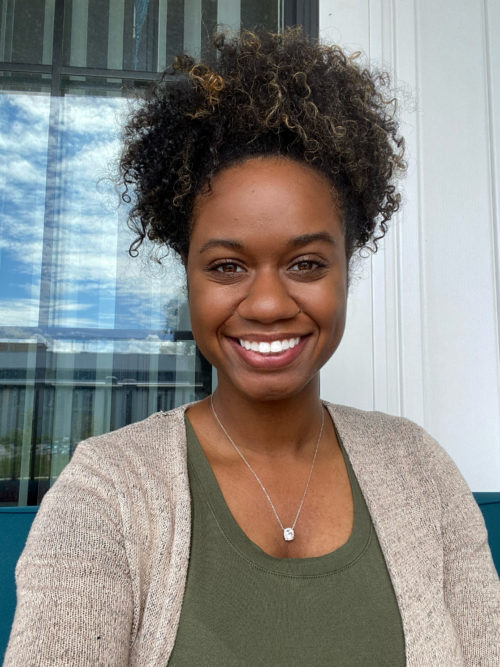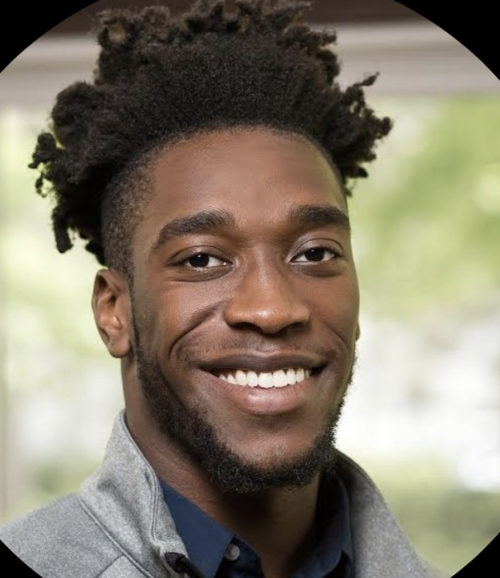At the age of 12, she moved with her family from Colorado to Delaware, where she would attend Howard Technical High School on the HVAC track before joining the TeenSHARP program and setting her sights on studying film in college.
As a DACA student born in Mexico, Villamares faced challenges during the college application process.
“A lot of colleges at the time didn’t accept DACA students as domestic students, so they would have considered me an international student,” she said. “That had a lot to do with financial aid. So when it came time to look at all of my options in terms of college, [TeenSHARP] made sure to help me find colleges that considered DACA students domestic students, so that I could apply as part of the domestic pool, which is more likely to get accepted than the international pool. It also includes financial aid, because I couldn’t receive federal or state aid.”
There are many paths to career success. For some, the challenges are heightened — but they can be overcome.
TeenSHARP has been helping under-resourced teens in the Greater Philadelphia region get into college, and the solid careers that follow, since it was founded by Atnre Alleyne and Tatiana Poladko Alleyne in 2009. In 2017, the org moved its headquarters to Wilmington and hosted its first graduating class of Delaware students the same year.
Now, members of that first Delaware cohort are graduating college, with some of those grads finding jobs in tech returning to Delaware for the next stage of their journeys.

Students in the TeenSHARP program are low income, usually Black and/or Latinx. Some are the firsts generation living in the US, and most are the first in their families to go to college. The org prepares these young people through an extracurricular and summer program that both fills educational gaps, and advocates for students to be put into the honors classes that give them an edge in the college acceptance process.
Students are then guided through applying to the colleges of their choice, including Ivy League schools, and for scholarships. Most TeenSHARP students get accepted to one of their top-choice schools with scholarships.
Given an exceptional level of opportunity, how do these students fare after college? Technical.ly talked to TeenSHARP grads who’ve returned to Delaware and asked: How did you get here?
‘She’ll have a future because I went through all the weeds’

Iyanna McCoy, a business development manager for Microsoft XBox, was born to a young teen mother in the foster care system. Growing up, they moved multiple times between Philadelphia and Kenosha, Wisconsin, with McCoy finally landing at William Penn High School in New Castle. While in and out of the foster system, McCoy’s mother had graduated high school and attended Temple University for electrical engineering until the balance of single motherhood and college became unsustainable.
McCoy came to TeenSHARP later than some, in her final years of high school.
“They helped me go through the college application process,” she said. “They helped me answer the really tough questions. When I was applying to Ivy League schools like Brown [University], they wanted to know what my father does, even though I kept telling them I really don’t have a father. It was really frustrating. But luckily, I was able to get accepted into a couple universities. The University of Delaware was by far my greatest option because they had a commitment to Delawareans and I didn’t have to be too far away from my mom.”
With TeenSHARP’s support through her college years, McCoy was able to land internships and a summer of research for UD’s Center for Research in Education and Social Policy. Still, it took some time for her to figure out what she really wanted to do, including short-lived majors in computer science, accounting and business — “I’m not going to go to school if I’m not going to get a degree that’s going to be able to pay the bills for me and my mom and my siblings,” she reasoned.
After making those pivots, she shifted to UD’s Management Information Systems program, where she was able to receive credit for her previous courses, and she graduated in four years.
Post-graduation posted new challenges.
“Because I only had 3.0 GPA, I lost out on a lot of opportunities in the business world and in the computer science world,” she said. “So I would go out to conferences and put my face in front of people, but I never put my GPA on my resume. Every now and then people will ask me why. And I’ve told my whole entire testimony about like, you know, that number should not solidify how great of a worker that I am.”
After round of interviews with companies like American Express, Bloomberg and Boeing, Microsoft reached out to her after she had made some connections through LinkedIn.
“At first I thought it was a scam,” she said. “Why would Microsoft reach out to me? I clicked the link and I didn’t see any spyware, so I applied.”
A few rounds of interviews later, she was offered the job and was put on the XBox team. In September, she got a promotion within the department, less than a year after starting. She works remotely from the home she purchased in Delaware this year.
While one of McCoy’s goals was to support her mother and siblings, TeenSHARP saw her mother’s own potential and encouraged her to go through Zip Code Wilmington’s coding bootcamp. She is now a software engineer.
“I have a sister who’s 4 years old,” McCoy said. “I know that she’ll have a future because I went through all the weeds. Now it’s like, OK, they can follow suit.”
‘Never be afraid’

Amadou Tine was a classmate of McCoy’s at William Penn who moved to New Castle from Manhattan, New York and connected with TeenSHARP as a sophomore. He recalls a presentation the org gave to students, and how it changed his view of his future.
“It really expanded my view on not only the selective colleges that were within my reach but how I could be a top applicant at those institutions,” Tine said.
With the help of TeenSHARP, he went to Carleton College in Minnesota, where he took what he’d learned preparing for college and applied it to preparation for the workforce.
“Get as much exposure as you can to the related field whether that be through internships, side projects or even taking online courses to develop your coding skills,” he advises now. “Anything you do related to the field will help you in your journey in one way or another.”
After graduation, Tine came back to Delaware and got a job as a data science analyst with JPMorgan Chase.
His advice to anyone interested in pursuing a similar career path is to stay persistent in your networking, even after you’ve landed the job.
“Never being afraid to reach out to people in those positions that you aspire to be in,” he said. “Just make sure you remain professional and confident when you reach out and you should be fine.”
Pursuing the dream

Though it was only a few years ago, Villamares’ college-going challenges made her feel like she was cutting a new path for other DACA students, because it was so rare for people in her position to even attempt to apply for college as a domestic student.
“A lot of people just didn’t even think that was an option for them,” she said.
She ended up at Wesleyan University in Connecticut, where she majored in film and spent summers interning with documentary centers in New York City, including Firelight Media and Maysles in Harlem.
As a graduate, Villamares is still involved with filmmaking – her short film “Anastasia” was featured in the Dirty Popcorn Film Festival at the Delaware Art Museum in August. The skills she’s learned as a film major also led her to her mostly remote job as communications and digital media director at Rodel in Wilmington.
Landing that job was the result of network connections through TeenSHARP. A former program manager with the org started working at Rodel and thought she would be perfect for the position.
“My [film school] skills were very transferable into project management, content creation, content ideation,” she said “And I’ve just always been into social media. You know, TikTok, Instagram, Facebook, Twitter — I’m on all the platforms. There are a lot of options that you can branch out to.”
Ultimately, like her TeenSHARP classmates, much of her success so far has to do with the networking opportunities she’s had.
“That’s something that’s underestimated, how important those connections are,” she said. “Make friends with your professors. Reach out to them. Keep in contact with people that you’ve worked for before and keep good working relationships, because they’re going to become your recommendations. They’re going to become the people who are saying your name in the room, basically. Network with people who have helped you and who’ve employed you before.”







